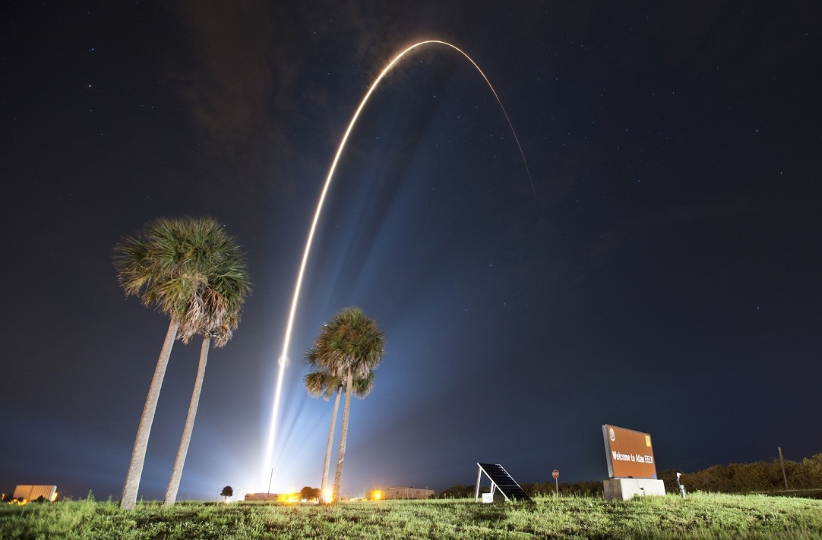[SatNews] The creation, build, and subsequent launch of a satellite is not an independent endeavor, and interesting insight follows a successful launch, today we hear from...
Statement From Boeing Regarding Friday's Launch
CAPE CANAVERAL AIR FORCE STATION, Florida, August 2, 2014 – A Boeing [NYSE: BA] Global Positioning System (GPS) IIF satellite, launched late yesterday, has sent the signals to controllers that confirm it is currently operating properly within the constellation that millions of people rely on for timing and navigation information.

An Atlas V rocket successfully carried an Air Force GPS satellite into orbit. (Credit: ULA)
GPS IIF-7 was launched aboard a United Launch Alliance Atlas-5 rocket from Cape Canaveral. It is the seventh of 12 such satellites Boeing has built for the U.S. Air Force, and the third on-orbit delivery this year.
“We are providing our Air Force partner and GPS users with a steady supply of advanced GPS IIFs,” said Craig Cooning, president of Boeing Network & Space Systems. “Our robust launch tempo requires vigilance and attention to detail, and mission success is our top priority. We continue to partner with the Air Force and ULA to effectively execute the launch schedule.”
Boeing and the Air Force will complete the full on-orbit checkout of the satellite next month. The GPS IIFs offer improved signal accuracy, better anti-jamming capability, longer design life and the new civilian L5 signal.
GPS IIF-8, slated for launch during the fourth quarter, arrived at Cape Canaveral on July 16 to undergo final launch preparations.
A unit of The Boeing Company, Boeing Defense, Space & Security is one of the world's largest defense, space and security businesses specializing in innovative and capabilities-driven customer solutions, and a versatile manufacturer of military aircraft. Headquartered in St. Louis, Boeing Defense, Space & Security is a $33 billion business with 56,000 employees worldwide.
Orbital Sciences Statement Regarding Launch
DULLES, Virginia (BUSINESS WIRE)—August 1, 2014— Orbital Sciences Corporation (NYSE: ORB), one of the world’s leading space technology companies, announced today that three satellites the company designed, built and tested for the U.S. Air Force were successfully deployed following their launch aboard a Delta IV rocket from Cape Canaveral, Florida, on July 28, 2014. These deployments continued Orbital’s “summer surge” of operational activity that has included the fourth launch of its Antares rocket which deployed the third Cygnus cargo logistics spacecraft, a launch of the company’s OBV long-range missile defense interceptor, the deployment of the Orbiting Carbon Observatory-2 satellite for NASA, and the successful launch of three suborbital research rockets, all of which took place since late June.
This week’s launch carried two Orbital-built satellites for the Air Force’s Geosynchronous Space Situational Awareness Program (GSSAP). The spacecraft will operate in near-geosynchronous orbit, collecting Space Situational Awareness (SSA) data for more accurate characterization of man-made objects in Earth orbit. The goal of the program is to enhance the country’s knowledge of the geosynchronous orbit environment for more timely and accurate orbit predictions to improve spaceflight safety.
The Delta IV rocket also carried the Automated Navigation and Guidance Experiment for Local Space (ANGELS) satellite, another Orbital-built spacecraft for the Air Force Research Laboratory (AFRL). As part of AFRL’s research in the SSA field, the ANGELS program will examine techniques for providing a clearer picture of the environment around the country’s vital space assets. The ANGELS spacecraft will conduct experiments in close proximity to the spent upper stage of the Delta IV rocket that launched it into orbit. The Air Force will use the results to evolve the ability of future space systems to responsively perform SSA activities from a safe distance from observed objects.
“The capabilities of the GSSAP and ANGELS satellites demonstrate Orbital’s innovative operational approaches in support of our customers’ vital missions,” said Mr. Christopher Long, Orbital’s Senior Vice President of National Security Satellite Programs.

